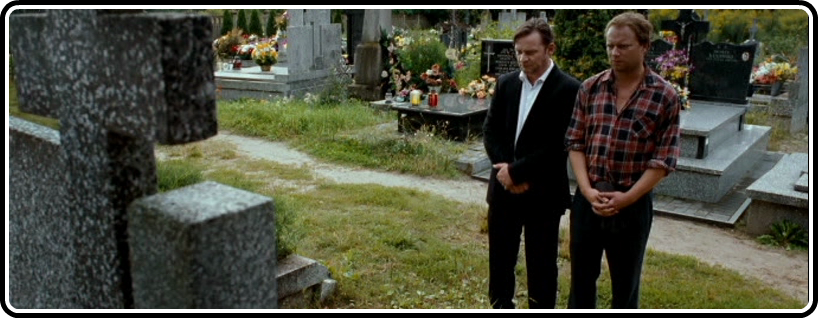
Viewers just settling in to watch Aftermath, without benefit of any hints or previews of what to expect, wouldn’t be faulted at all for surmising after the first half hour or so that they’re in for a modest melodrama revolving around a pair of estranged brothers working their painful, guilt-wracked way through some long-standing unresolved family tensions. Franek, the older of the siblings, is a Polish emigre just returning to his home after two decades spent laboring in Chicago, with little material fruit but plenty of disillusionment to show for his efforts. Beyond getting himself out of a dead-end phase of his life, Franek’s purpose is to reconnect with his brother Józek, whose wife and children have recently left him for what, ironically enough, appears to be a one-way trip to the USA. From what Franek can gather, Józek’s eccentric behavior has made him an outcast in the insular rural village the brothers grew up in, and is now on the edge of tipping over into monomania. The younger brother’s obsession has led him to scour the roads and byways surrounding the community, finding tombstones from abandoned Jewish graves that have been used as paving materials by the locals, and setting them up in a field on the outskirts of the village. What would drive Józek in such an endeavor?
It’s to director Wladyslaw Pasikowski’s credit that he allows the tensions to build slowly, sneaking up on his audience so that when the awful truth of this family’s fractious history is revealed, we suddenly find ourselves immersed in a morbidly fascinating suspense thriller. The villagers aren’t merely annoyed with Józek, they are outright hostile. As Franek decides to align himself with his brother’s efforts, rather than tamp down his zeal, it quickly becomes clear that dark and disturbing secrets are in danger of being brought out into the harsh and unforgiving light of day. The anxieties provoked by the relentlessly escalating conflicts between the brothers and their antagonists attack us at various levels – the personal and the familial, the psychological and the spiritual, all the while tapping into our awareness of historic legacies that our protagonists can’t escape and grotesque prejudices that they can’t effectively resolve.
Though Pasikowski has been directing for over 20 years now, including some valuable tutelage under Criterion Collection alumnus Andrzej Wajda (Ashes and Diamonds, Danton and others), I get the impression that this is the first of his films to make any kind of significant inroads outside his domestic market. Much of the attention that Aftermath has generated in winding its way through the North American film festival circuit stems back to the extraordinary controversy that the film stirred up in Poland. It might be the most divisive and polarizing movie to emerge from that country in the past few decades, because it throws some serious dissonance into the conventional wisdom of what went on in the Polish countryside in the dark years during the Nazi occupation of World War II. The furor that Aftermath sparked reached such a fever pitch that there are still regions in Poland where the film has been censored and Pasilowski himself has been vilified as a traitor and propagandist. As is so often the case, all that attention has only elevated Pasilowski’s profile. His new film, Jack Strong, a political thriller set in the early 1980s, about a double agent whose loyalties pivot between the old USSR and the American CIA, is actually debuting in Poland this weekend. With a lot of justly deserved attention directed toward the PIFF debut of The Last of the Unjust, Claude Lanzmann’s belated postscript to his monumental masterpiece Shoah, I have to give a strong nudge to anyone seeking to deepen their understanding of that agonizing chapter of 20th century history to take in Aftermath as a heavy, somewhat fictionalized but highly thought-provoking and complimentary companion piece.
Aftermath will show at the following times and locations:
Sun, Feb 9, 2014 at 8 PM (Cinema 21 (large theater))
Tue, Feb 11, 2014 at 8:30 PM (Fox Tower)


